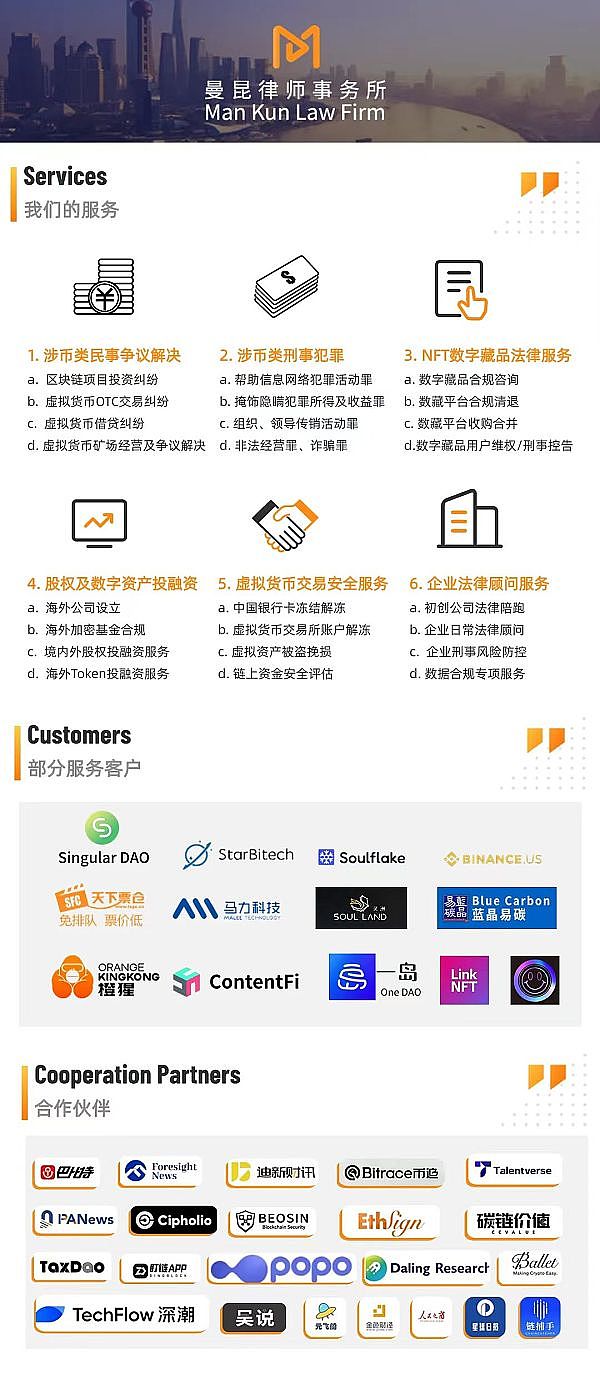Special statement:
This article is an original article by Shanghai Mankiw Law Firm. It only represents the personal views of the author of this article and does not constitute legal consultation or legal opinions on specific matters. If you need to reprint the article, please contact Mankun Law Firm staff: MankunLawFirm

Professional answers from lawyer Liu Zhengyao
After the "Card Discontinuation Action", telecommunications, banks and other institutions have increased their supervision of phone cards and bank cards. Due to its anonymity, virtual currency has been favored by the traditional "black and gray industry" , criminal actors such as fraud, gambling, money laundering, and pyramid schemes began to use virtual currencies to carry out illegal and criminal activities.
It should be noted that this does not mean that people engaged in the virtual currency business are engaging in illegal and criminal activities, but that people who are already engaging in illegal and criminal activities choose to use virtual currencies. Lawyer Liu has come into contact with many friends in the currency circle. Many of them have ideals, feelings, and work diligently.
For criminal-related virtual currency cases, judicial authorities currently have two common approaches: one is to entrust a third-party company to handle the cash during the public security investigation stage. Of course, in practice, there are cases where suspects or suspects’ family members entrust third-party companies to dispose of virtual currency and realize it. However, given that suspects in current criminal cases involving virtual currency are generally detained or under residential surveillance in a designated residence, during this period the suspect himself It is definitely not possible to proactively contact third-party companies. You must have permission or even "guidance" from the public security agency; secondly, the virtual currency involved in the case is only detained by the public security and procuratorate, and will be disposed of and liquidated by the court enforcement bureau after the case is judged. . The specific method can only be to entrust a third-party company (most of them appear as xxx technology companies on the market) to dispose and realize the money.
So under the current regulatory policies, the judicial authorities also understand that they cannot actively participate in the process of disposal of virtual currencies, whether the judicial authorities actively entrust a third-party company to handle it, or the parties to the case or their family members entrust a third-party company Disposal, the exchange between the virtual currency involved and legal currency seems to be currently only possible through third-party companies, but is this legal?
The so-called third-party company disposes of the virtual currency involved in the case on its behalf, which means that a domestic company accepts the entrustment of the judicial authority to realize the virtual currency involved in the case and then transfers it to an account designated by the judicial authority. There are two common delegation methods:
(1) Directly accept personal entrustment
When a resolution company accepts the entrustment of the parties involved in the case or their family members to dispose of the virtual currency involved in the case, it is usually sufficient for the parties or their families to directly sign an agreement with the resolution company. There is no direct and obvious decision by the judicial authority. >Traces of intervention. In this case, the biggest legal risk is the disposal of the company, because ten ministries and commissions, including the "Two High Schools and One Ministry of Finance", issued the "Notice on Further Preventing and Dealing with the Risks of Speculation in Virtual Currency Transactions" (hereinafter referred to as the "9.24 Notice") In it, it is clearly stated that “carry out exchange business betweenlegal currency andvirtual currency, exchange business between virtual currencies, and act as a central counterparty to buy and sell virtual currencies. ,Providing information intermediary and pricing services for virtual currency transactions,,,,,,” is an illegal financial activity. At this time, for the disposal company, it may be a violation of regulatory regulations, or it may involve illegal crimes (such as illegal business crimes).
(2) Accepting entrustment from judicial authorities
For the case where the judicial authorities (mainly the public security organs) entrust a disposal company to realize the virtual currency involved in the case, although this entrustment itself has a legal basis (such as Article 236 of the "Procedural Regulations of the Public Security Organs in Handling Criminal Cases", "Public Security Organs Handling Criminal Cases Procedural Regulations", Article 34 of the "Relevant Provisions on the Application of Seizure and Freezing Measures in the Handling of Criminal Cases"), but the content of the entrustment obviously does not meet the requirements of the 9.24 Notice, that is, as long as the disposal company conducts the exchange business between legal currency and virtual currency in mainland China, it is considered to be carried out. Illegal financial activities. As for whether the purpose of disposal to serve the judicial authorities can prevent or offset the illegal financial activities specified in the 9.24 notice, Lawyer Liu believes that judging from legal feelings or moral sense, the assets seized by the judicial authorities It is worthy of recognition that the virtual currency involved in the case provides help in the realization of the virtual currency in order to promote the smooth progress of judicial activities; however, strictly speaking from the legal provisions or current regulatory provisions: no matter what the purpose, as long as the exchange business between virtual currency and legal currency is carried out, it is forbidden. In practice, Lawyer Liu also encountered an incident where Company B (a virtual currency disposal company) was entrusted by the public security of place A to dispose of and realize cash. The police of place C came to Company B because Company B had collected part of the cash during the disposal process. The funds involved electronic fraud funds. The reality is so fragmented. Even if many disposal companies like Company B are endorsed by the local public security organs, they cannot guarantee 100% safety.
Therefore, in the current judicial environment, who a third-party company accepts as entrustment is not an essential factor in the judgment of compliance. The only basis for judgment is what behavior the third-party company performed after accepting the entrustment. For third-party companies to conduct the exchange business of virtual currency and legal currency, whether it is for the purpose of collecting handling fees for profit or for the purpose of serving the judicial authorities, they cannot escape the regulatory provisions of the 9.24 Notice, that is, they are all illegal financial activities.

Liu Zhengyao
Senior lawyer at Shanghai Mankiw Law Firm
Lawyer Liu Zhengyao, Master of Criminal Law, has workedinbanks and courts< strong>, has accumulated extensive legal practice experience, and holds certificates such as senior corporate compliance officer and psychological counselor, and is committed to serving Provide high-quality legal services to clients.
Main business areas:
Criminal defense, corporate legal services, Legal services involving blockchain, virtual currency, crypto funds and other Web3.0 fields.
Core Strengths:
Attorney Liu has rich practical experience in the fields of cyber crime, economic crime, intellectual property crime and tax-related crime. His meticulous working style and excellent case handling ability have won him clients of high praise.
Lawyer Liu is able to provide comprehensive legal support for cases in the Blockchain, virtual currency, crypto-fund and other Web3.0 fields, including the defense of criminal cases that occur frequently in the currency circle, strong>Bank card unfreezing, criminal prosecution and contract dispute agency and other services. Attorney Liu deeply understands the legal challenges of these emerging technologies and industries and is able to develop the best solutions for clients.

 Cheng Yuan
Cheng Yuan












